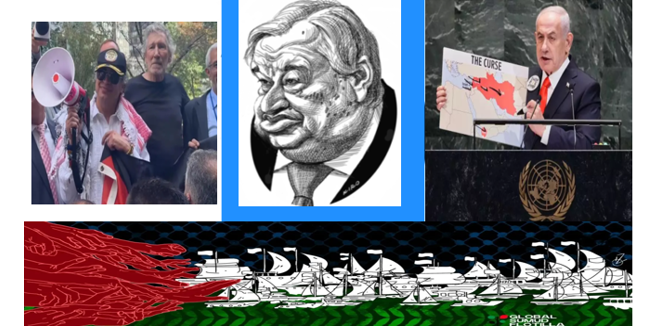بهمن کلباسی، بیبیسی فارسی،
۱۷/۹/۲۰۲۵
بهمن کلباسی خبرنگار بیبیسی
فارسی در سازمان ملل متحد در
نیویورک است. رونویسی توسط تلاکسکالا
شاهد
قریشی، در دفتر روابط عمومی وزارت خارجه آمریکا کار میکرد و اخیرا از کارش برکنار
شد. آقای قریشی در برنامه گفتوگوی ویژه به بهمن کلباسی میگوید: تسلیت به خانواده
خبرنگارانی فلسطینی که ارتش اسرائیل در غزه کشت و تاکید بر مخالفت آمریکا با
پاکسازی قومی درغزه مواضعی بود که او براساس روند معمول قصد داشت در بیانیههای
وزارت خارجه بگنجاند و همین سبب اخراج او شده است. آقای قریشی در نخستین گفتوگویش
با یک رسانه فارسیزبان پس از اخراجش از وزارت خارجه آمریکا از آنچه رخ داد و
تجربهاش از کار در دولتهای مختلف آمریکا میگوید.
شاهد قریشی در روابط عمومی وزارت خارجه آمریکا کار میکرده و اخیراً از کار بیکار شده. او سعی کرده در بیانیههای وزارت خارجه، بر اساس روند معمول، تسلیت به خانواده خبرنگاران فلسطینی که ارتش اسرائیل کشته و مخالفت با پاکسازی قومی در غزه را بگنجاند و میگوید همین سبب از کار بیکار شدنش شده. این نخستین گفتوگوی او با یک رسانه فارسیزبان پس از اخراجش از وزارت خارجه آمریکاست و در آن هم در مورد تجربهاش در دو دولت پیشین و فعلی میگوید و هم آنچه که رخ داد.
من بهمن کلباسی هستم و در گفتگوی ویژه با این کارمند پیشین وزارت خارجه آمریکا صحبت میکنم. شاهد قریشی، سپاسگزارم از فرصتی که در اختیار بیبی سی فارسی گذاشتید. پیش از اینکه وارد ماجرا بشویم، میشود مقداری در مورد خودت صحبت کنی؟ کجا به دنیا آمدی؟ کجا بزرگ شدی؟
شاهد قریشی: بله،
من در
شهر سیاتل
به دنیا
اومدم در
سال ۱۹۹۱
میلادی. برای
دانشگاه، من
روابط بینالملل
خوندم در
دانشگاه واشینگتن.
پدر و
مادرم از
اهل شهر
ساوه در
ایران هستند
و در زمان
انقلاب به
آمریکا آمدند. بعد
از اینکه
کارشناسی گرفتم،
رفتم به
شهر واشینگتن
و کارشناسی
ارشدم را
در همان
درس روابط
بینالملل
گرفتم.
بهمن کلباسی: چگونه شد که وارد کار در وزارت خارجه آمریکا شدید؟
شاهد قریشی: از
جوانی و
پس از
حمله آمریکا
به عراق،
نسبت به
جنگهای
بیپایانی
که ایالات
متحده درگیر
آن شده
حساس شدم
و حس کردم
تصویری که
در آمریکا
در مورد
عراق پیش
از حمله
به آن
کشور در
افکار عمومی
شکل گرفت،
به توجیه
آن عملیات
کمک کرد.
وقتی
برای دیدار
با خانواده
به ایران
میرفتیم
و برمیگشتیم
آمریکا و
میدیدیم
شبیه آن
تصویر منفی
در مورد
ایران شکل
گرفته، نگرانم
میکرد
که آنچه
در عراق
رخ داد
میتواند
در مورد
ایران هم
تکرار بشود. برای
همین، خیلی
فعال شدم
در نهادهای
مدنی که
برای پایان
دادن به
جنگ در
عراق و
افغانستان و
پیشگیری از
تکرارش در
ایران کار
میکردند. همزمان،
کار در
وزارت خارجه
هم به
عنوان یک
دیپلمات برایم
جذاب بود،
هم برای
فهم نیروهایی
که کشور
را به
جنگ میبرند
و هم برای
کمک به
یافتن راههای
دیپلماتیک برای
اختلافها
به جای
جنگ. خیلی
خوشحالم که
توانستم مدتی
آنجا کار
کنم.
بهمن کلباسی: وقتی وارد وزارت خارجه آمریکا شدی، دقیقاً در این شغلی که داشتی در روابط عمومی وزارت خارجه چه میکردی؟ شرح وظایفت چه بود؟
شاهد قریشی: در
شهریور سال
گذشته، به
عنوان رابط
رسانهای
به تیم
روابط عمومی
وزارت خارجه
آمریکا در
مورد وقایع
لبنان و
اردن پیوستم. رابط
رسانهای
دو کار
اصلی دارد. یکی
اینکه پیوسته
سخنگوی وزارت
خارجه را
پیش از
اینکه پشت
جایگاه گفتوگو
با خبرنگاران
برود، در
جریان آخرین
تحولات، اخبار
و پرسشهایی
که رسانهها
ممکن است
بپرسند، بگذارد. البته
در مورد
حوزه مورد
پوشش خودم
که اردن
و لبنان بود،
تا آمادگی
داشته باشد
مواضع دولت
را در
پاسخها
شرح دهد. کار
دوم رابط
رسانهای
این است
که اگر
رسانهها
پرسشی مثلاً
در مورد
موضع دولت
آمریکا در
مورد یک
واقعهای
در لبنان
دارند، آنها
را پاسخ
دهد. پس
از چند
ماه که
در آن
پست بودم،
مقامهای
وزارت خارجه
تصمیم گرفتن
به من
اعتماد کنند
و وظیفه مهمتر،
یعنی رابط
رسانهای
برای تحولات
در اسرائیل
و فلسطین
را به
من بدهند
که میتوانید
تصور کنید
در میانه
این جنگ،
شغل بسیار
سنگینتری
بود. هر
روز از
شبکههای
گوناگون خبری
از من
در مورد
موضع آمریکا
یا واکنش
آمریکا به
رخدادی در
جنگ اسرائیل
در غزه
میپرسیدند. وظیفه
من، چه
در دولت
بایدن و
چه در
دولت ترامپ،
این بود
که فهم
خودم از
موضع دولت
آمریکا را
مینوشتم
و پیش از
اینکه به
خبرنگاری که
پرسش را
طرح کرده
بفرستم، به
مقامهای
ارشد وزارت
خارجه در
بخشهای
گوناگونی که
به موضوع
اشراف دارند،
نشان میدادم. آنها
خط به
خط آنچه
نوشته بودم
را مرور
میکردند
و اگر لازم
میدیدند
واژه یا
چند خط
را برداشته
یا به
آن اضافه
میکردند.
وقتی
متن نهایی
میشد،
به طبقه
هفتم ساختمان
وزارت خارجه،
جایی که
مشاوران و
معاون ارشد
وزیر خارجه
هستند، میفرستادم
تا تأیید
بشود و
سپس به
خبرنگار به
عنوان موضع
رسمی دولت
آمریکا میدادم
یا
پیش از
نشست خبری
در اختیار
سخنگو میگذاشتم
تا در
پوشهای
که با
نام کشورهای
مختلف همراه
دارد، بگذارد
که اگر
همان پرسش
در نشست
مطرح شد،
آمادگی پاسخ
دادن داشته
باشد. وقتی
شما در
یک خبر
که یک
رسانه نوشته
میخوانید "یک
سخنگوی وزارت
خارجه به ما
گفت فلان"، آن مقام
من یا
یکی دیگر
از رابطهای
رسانهای
هستند. همان
طور که
گفتم برای
هر منطقه
یا قاره
یک یا
چند رابط
رسانهای
وجود دارد.
بهمن
کلباسی: بریم به آن هفتهای که سبب اخراجتان شد. دقیقاً چه رخ داد در آن هفته و چه چیزهایی را شما میخواستید در بیانیههای وزارت خارجه یا پاسخهایتان به خبرنگاران بگنجانید که خشم و ناراحتی مقامهای ارشد وزارت خارجه را برانگیخت؟


